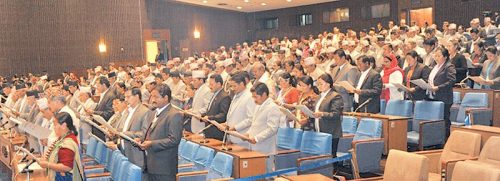Kathmandu, Dec 25,, The third session of the Federal Parliament is commencing tomorrow, Wednesday. The Federal Parliament is bicameral made up of the House of Representatives (the lower house) and the National Assembly (the upper house).
President Bidya Devi Bhandari has summoned the session for 4:00 pm tomorrow. The Nepal’s constitution has conferred the right to calling and ending the Federal Parliament session to the President, on the recommendation of the government.
This session remaining as the winter session of the parliament is also considered as the ‘bill session’ and it will spend its entire duration on the discussions of drafts of bills and their endorsements.
According to Nepal Communist Party (NCP)’s deputy parliamentary leader Subash Nembang, the major responsibility of this session is to discuss on draft bills, analyse them and pass the documents.
As he said, the session this time is special and important as it will see the presentation of an ordinance relating to the employees’ adjustment and as it has to formulate laws remaining in the common list of rights as well as amend or replace laws inconsistent with the constitution, to the extent of such inconsistency. As per the provision, laws inconsistence with the constitution either need to be amended or replaced by new ones within coming March 5, 2019 which marks the completion of one year of the first meeting of the Federal Parliament.
This issue is challenging and mandatory as well as the government has to determine such acts and both houses in the Federal Parliament should response them through a due process within a certain timeframe.
Minister for Law, Justice and Federal Affairs, Bhanu Bhakta Dhakal, said that 165 existing laws, out of 339, are complete as they are in line with the constitution and federalism while remaining others need to be amended or replaced.
“The government has been carrying out activities keeping the list of common rights stipulated by the Constitution, Article 304 of the Constitution and formulation of laws related to transitional justice in priority. There is a pressure as many works including formation of laws have to be completed within short timeframe,” he added.
Although registration of at least 35-40 bills was expected for the same, only three bills have been registered at the Parliament Secretariat so far, it is learnt.
Ordinance related to Civil Servant Adjustment would be presented in the House on the first day of the Parliament as the ordinance was issued at the time when Parliament was not in session.
Whip of Nepali Congress Parliamentary Party, Pushpa Bhusal, said that they would raise the voice in the House regarding the lack of government’s necessary attention to formulate laws on subjects mentioned in the common list and the amendment of contradictory laws.
She said, “We will raise the voice on various issues including corruption, price hike, weaknesses seen in peace and security and people’s concern.”
There is a constitutional provision that next Parliament session should be commenced within six months of the ending of first parliament session.
Speaker and Chairperson would read the letter received from the Office of the President regarding commencement of the House at their respective parliament in the first House meeting.
Seven bills registered at the House of Representatives and seven bills registered at the National Assembly at the time when the erstwhile businesses were underway would be sent to each other’s House for the discussion.
Formulating laws regarding jurisdiction of the federation, forming government, holding discussion on government’s policies and programmes and approving it, amending constitution are the main activities of the Federal Parliament.
Similarly, holding discussion on budget and approving it, monitoring government’s regular work execution, directing and suggesting the government and approving international agreements are the main task of the Federal Parliament.
There are 112 women lawmakers in the 334-member Federal Parliament. The House of Representatives, the lower house of the Federal Parliament has 275 members while the National Assembly, the upper house, has 59 members.
Nepa Communist Party (NCP), Nepali Congress (NC), Rastriya Janata Party Nepal (RJPN), Sanghiya Samajbadi Forum, Naya Shakti Party Nepal, Nepal Workers Peasants Party, Rastriya Janamorcha and the Rastriya Prajatantra Pary are representing in the House of Representatives. Chhakka Bahadur Lama is an independent lawmaker.
The NCP, NC, RJPN and the Sanghiya Samajbadi Forum are representing in the National Assembly. In addition to these party representatives, three lawmakers have been nominated by the President. There are 10 parliamentary committees under the House of Representatives, four under the National Assembly and two joint committees.
The centre, provinces and the local levels have their own lists for legislation. Each level should prioritise making own laws while the centre should take the leadership in formulating laws related to the subjects included in the common list of rights.
Spokesperson of the Federal Parliament Secretariat Dr Roj Nath Pandey said all the preparations have been completed for the parliament session scheduled for Wednesday.
The government and the parliament have the challenge of carrying out their works being very active and conscious as they have a huge load of legislation in short time.
—
Federal Parliament’s third session has lot of work to do

